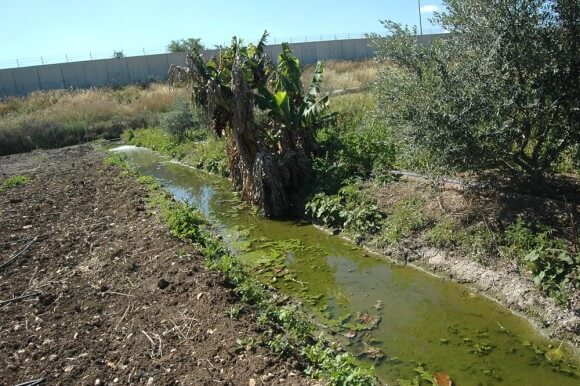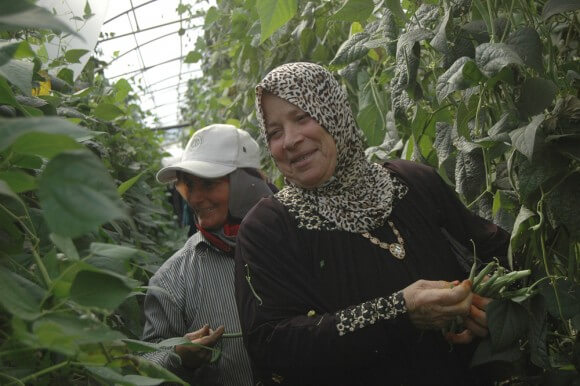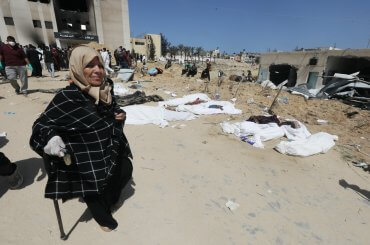Fayez Tneeb, 50, marveled at his organically grown banana tree even though it is failing and rooted in a waste water stream. He and his wife Mona, 50, are proprietors of Hakoritana Farm in Tulkarm, located in the northern West Bank only 100 meters from Israel. For the Tneebs, harvesting pesticide-free agriculture that they take to a local market is a constant struggle. The couple’s plot of land is caught between an Israeli factory that manufactures fertilizers and agrochemicals, and Israel’s separation barrier.
The factory, owned by Geshuri and Sons Industries, does not have a functional sewage system. The waste seeps out from under the brick walls that line the industrial zone where it is housed. It then spills onto the Tneeb’s farmland. The toxic stream ought to be taken through piping into Israel’s sewers. Yet, the Israeli separation wall blockades the toxic runoff from reaching sewers on the other side. And so the pesticide waste floods onto the Tneeb’s organic groves.
Geshuri factory is one of just under a dozen Israeli manufacturing sites located in the occupied Palestinian territory. It was constructed in 1983 as a lone plant that later became part of the Nitzanei Shalom, or “Buds of Peace,” industrial zone in 1995. It is nestled just over the Green Line in Tulkarm, in the West Bank flanked by Tneeb’s farm to the west. No municipality governs the tax-free location that was built–and took its name–from the promise of bringing Israeli and Palestinians closer together through economic ties. Yet Palestinians view Israeli industrial zones and Geshuri in particular, as economically benefiting from the occupation because of an absence of restrictions on Israeli businesses operating over the Green Line.
“My history is in this farm and I look to my future in this farm,” Tneeb said. His grandfather purchased the plot of land in 1920. At that time they owned 32 dunams. But after the construction of the separation wall, swaths were trapped on the Israeli side of the barrier. He now only has access to 13 dunams.
“The main problem now is in winter, especially because of the wall. There should be a place for the run-off water,” Tneeb said of Geshuri factories waste. “They need to open the drainage system that is closed off.” He would do it himself, he said, describing closed and clogged grates under the wall that were constructed to transport the hazardous material. However, that area is under a closed military zone order. If he tampers with the wall, Tneeb risks arrest.
Tneeb’s neighbors share his complaints against Geshuri’s pollution. One other farm is also trapped between the wall and the chemical plants. To access the farms, they must drive on a rocky dirt road. Nearly the entire eastern side of Tneeb’s greenhouses are buffered by green pools of open sewage. Just ten meters beyond the dark water is Israel’s separation barrier. The sound of traffic fills the air, as Israel’s main north-south highway rests on the other side.
Moreover, daily some 600 Palestinian workers enter through an eastern gate in a wall that encircles brick and cement hangars. Israeli owners and managers use a separate crossing that leads back to Israel on the western side. Since their establishment, the factories have been marred by court battles over salaries. Palestinians say they should be paid an Israeli minimum wage because an Israeli family owns the factory. The Palestinian Authority has no jurisdiction over the industrial zone. The Israeli labor rights group Kav LaOved reported six compensation cases were brought before a judge since 2008, against just one of the companies inside Nitzanei Shalom.
“In the past, the land was under a one-meter flood,” said Tneeb while sitting inside of a small house where he takes shade during working hours. Tneeb has replanted his entire 13-dunam farm a handful of times over the past few decades. The first signs of trouble came in 1990 when Israel built an earth mound where the separation wall stands today, uprooting some of his vegetation. “Israeli bulldozers showed up and made a ridge in the soil. Two years later, they built a metal wall,” he said.

In Tulkarm many people believe that the chemical waste causes high cancer rates. While the Palestinian Ministry of Health does not log oncology data by region, preliminary research from Brown University shows cancer and respiratory illnesses in the Tulkarm district are “among the highest” in the West Bank. The factories—and Geshuri in particular—are widely believed by Palestinians to be the cause of these health problems, although causality has not been proven.
Geshuri and Sons Industries was reached for comment, but did not provide a response by the time of publication.
During the troubled Intifada years the industrial zone was a site of violent confrontation. Palestinians burned down three of the factories and one Israeli soldier was killed. In the aftermath the Palestinian Ministry of Environmental Affairs said the manufacturing sites “have long been a source of nuisance and extreme pollution,” going as far as labeling the factories,“chemical warfare against the Palestinian people.”
The tensions continue to date. Months ago in February, more than one thousand students from Tulkarm protested outside of the industrial zone. Their signs read: “no to pollution.”
In 2002 when construction of the concrete barrier, the one that still stands to date, began, all of Tneeb’s produce was destroyed. He described arriving at the farm early in the morning with Mona, his wife, “we walked to one of our greenhouses and we saw a bulldozer, a CAT-D9. It started to destroy everything, completely, the plants and the irrigation pipes.”
The next morning, the bulldozer returned with a series of Israeli army Jeeps, Tneeb recalled. “That evening you could see that my land was clean,” he said, swiping his hand through the air. The army declared his farm a closed military zone, a status that renders civilian entry illegal. It was not until 2007 that last soldiers would leave Tneeb’s beloved farm.
“I don’t believe in building walls to have security,” he said. Tneeb feels he is the one that needs protection. During the years that his farm was a closed military zone once a soldiers shot at him, the bullet grazing past his left ear. He called this a “pressure tactic” by the Israeli army. “In one second and only in one second I turned and leanded slightly to ash a cigarette,” he said. As his face was glancing off to the side the bullet past him and smashed into a building behind him. In shock, Tneeb fell to the ground. A terrified Mona rushed toward him. “I think I am lucky to be married to a women like Mona.”
Three times during this five-year period the army removed all of the plastic covering of Tneeb’s greenhouses, 8,000 meters of roofing. “Everyday I tried to enter by butting wires,” soldiers erected around his farm, “and many times we were beaten by soldiers,” he said.

As Tneeb continued, he sipped fresh mint tea, the leaves grown in his farm. The structure is squat between a dozen greenhouses where Tneeb also grows cucumber, tomato, green bean, pepper, potato, strawberry, and the springtime favorite, loquat. His toilet is compostable and, filled with sawdust and bright green mint leaves that masks foul odors. But when heavy winter winds come, Tneeb’s farm wreaks of factory fumes and a red-beige dust settlers over his crops.
“We cannot continue like this. It is not impossible to live together—it is sinful to waste time,” Tneeb mused before heading off to one of his greenhouses where Mona was having a laugh, and plucking green beans with a neighbor.



The Israelis rape the Palestinians’ land, they steal and pillage, they attempt murder and succeed often, and they poison the environment.
They are criminals in every sense of the word. Where is the Erin Brockovich et al of Israel?
““We cannot continue like this. It is not impossible to live together—it is sinful to waste time,””
Amen, Tneeb.
Thanks for the article and the great pictures, Allison. I am glad that Mona, her friend, and Tneeb still find something to laugh and smile about. That’s something, and it’s called Sumud.
right right the land to all farmers in the Palestine
What inspiring people.!! Our silence regarding this ongoing horror is monstrous!